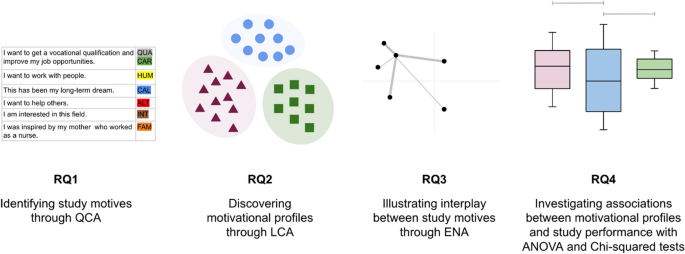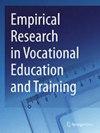Learning analytics to explore the motivational profiles of non-traditional practical nurse students: a mixed-methods approach
IF 3.1
Q2 EDUCATION & EDUCATIONAL RESEARCH
Empirical Research in Vocational Education and Training
Pub Date : 2023-10-21
DOI:10.1186/s40461-023-00150-0
引用次数: 0
Abstract
Abstract Learning analytics provides a novel means to examine various aspects of students’ learning and to support them in their individual endeavors. The purpose of this study was to explore the potential of learning analytics to provide insights into non-traditional, vocational practical nurse students’ (N = 132) motivational profiles for choosing their studies, using a mixed-methods approach. Non-traditional students were somewhat older learners than those following a more straightforward educational pathway and had diverse educational or professional backgrounds. Institutional admission data and analytics were used to identify their specific study motives and distinct motivational profiles, and to illustrate the connections between the motives emerging in the motivational profiles. Furthermore, the association between the motivational profiles and study performance was examined. The results of qualitative content analysis indicated that non-traditional practical nurse students pursued such specialized training for various reasons, and that pragmatic, professional rationales were emphasized over prosocial, altruistic factors. Through the adoption of person-centered latent class analysis, three motivational profiles were identified: self-aware goal-achievers, qualification attainers, and widely oriented humanitarians. Additionally, the analyses of epistemic networks for the profiles showed the complex interplay between the motives, confirming that some motive connections appear to be more prominent than others. Moreover, the findings indicated that study motives reported at admission did not seem to dictate students’ later study performance, as no statistically significant associations were found between the motivational profile and the students’ final grade point average or study dropout. This investigation paves the way for more-targeted motivational support and the use of learning analytics in the context of vocational education and training.

学习分析以探索非传统实用护士学生的动机概况:混合方法方法
学习分析提供了一种新颖的方法来检查学生学习的各个方面,并支持他们的个人努力。本研究的目的是探索学习分析的潜力,以提供对非传统、职业实习护士学生(N = 132)选择学习的动机概况的见解,采用混合方法。非传统学生比那些遵循更直接的教育途径的学生年龄稍大,并且具有不同的教育或专业背景。利用院校录取数据和分析来确定他们的具体学习动机和不同的动机概况,并说明动机概况中出现的动机之间的联系。此外,我们也检视了动机档案与学习表现之间的关系。质性内容分析结果显示,非传统护理专业学生进行专业培训的原因多种多样,注重实用主义、专业主义的因素多于亲社会、利他主义的因素。通过采用以人为中心的潜在阶层分析,我们确定了三种动机特征:自我意识的目标完成者、资格获得者和广泛导向的人道主义者。此外,对档案的认知网络分析显示动机之间复杂的相互作用,证实了一些动机联系似乎比其他动机更突出。此外,研究结果表明,入学时报告的学习动机似乎并没有决定学生后来的学习表现,因为动机概况与学生最终的平均成绩或退学之间没有统计学上显著的关联。本研究为更有针对性的动机支持和在职业教育和培训的背景下使用学习分析铺平了道路。
本文章由计算机程序翻译,如有差异,请以英文原文为准。
求助全文
约1分钟内获得全文
求助全文
来源期刊

Empirical Research in Vocational Education and Training
Social Sciences-Education
CiteScore
3.40
自引率
7.70%
发文量
9
审稿时长
13 weeks
期刊介绍:
The main focus of this journal is to provide a platform for original empirical investigations in the field of professional, vocational and technical education, comparing the effectiveness, efficiency and equity of different vocational education systems at the school, company and systemic level. The journal fills a gap in the existing literature focusing on empirically-oriented academic research and stimulating the interest in strengthening the vocational part of the educational system, both at the basic and higher education level.
 求助内容:
求助内容: 应助结果提醒方式:
应助结果提醒方式:


